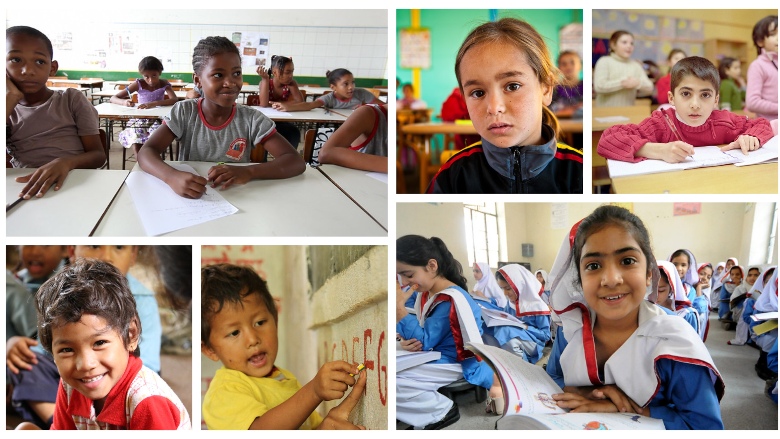In today’s rapidly changing economy, simply attending school is not enough. To succeed at work and in life, students must develop foundational knowledge and skills through core subjects like language, mathematics, and science—and they must also learn how to solve problems, communicate effectively, and work in teams. This is essential to develop human capital and dynamic, successful societies.
While access to schooling has experienced a dramatic increase around the world in recent decades, there remains a “learning crisis” that was aggravated by the COVID-19 pandemic resulting in increases in learning poverty. Indeed, over half of the world’s children cannot read a short story by the age of 10, making them ill equipped for success in the changing world of work. In many countries, learning outcomes are not measured at all. Students, families, governments, and teachers cannot make decisions about how to improve education without adequate, updated information on learning outcomes. Moreover, progress on the World Bank’s effort to decrease learning poverty can only be tracked if countries commit to systematic measurement of learning outcomes and strengthening their assessment systems.
Key definitions
- Assessment of learning —the process of gathering and evaluating information on what students know, understand, and can do—plays a vital role in making informed decisions at the individual, classroom, school, and system-wide levels. In general, information on learning tends to come from three types of assessment activities:
- Classroom assessment provides real-time information to support teaching and learning in individual classrooms;
- Examinations are used to make decisions about the progress of individual students through the education system (such as receiving a certification of school completion or being selected for university entry); and
- Large-scale assessment monitors learning trends at the system level and provides information to policymakers and practitioners on overall performance levels within an education system and the factors that contribute to that performance. Large-scale assessment tends to fall into one of two categories:
- National large-scale assessments offer feedback on the overall health of a particular education system at a specific grade and/or age level; and
- International large-scale assessments (such as the Program for International Student Assessment (PISA) and the Trends in International Mathematics and Science Study (TIMSS) provide information on the performance of the education system relative to other countries, also at a specific grade and/or age level.
Countries around the world have been working to achieve effective learning assessment systems, in other words, systems that provide timely information of sufficient quality and quantity to meet stakeholder information and decision-making needs in support of improved education quality and student learning outcomes. But far too many education systems are unable to monitor key education and learning indicators of quality because they do not have robust assessment systems in place to regularly measure learning outcomes.
Strategy
The World Bank has been leading the efforts in helping countries strengthen their learning assessment systems to support improved education quality and learning for all. Efforts have ranged from equipping teachers with the latest tools to assess students in the classroom and target instruction to learning gaps, to ensuring that examinations are fair and contribute to equitable access to higher education, to supporting implementation of large-scale assessments to facilitate evidence-based decision-making and attain improvement in learning outcomes at the system level.
As more and more countries express their desire to have timely and accurate information on their students’ learning, there is an urgent need to support these countries in building effective assessment systems, ones that have the requisite policies, structures, practices, and tools to achieve better learning outcomes.
To better advance the learning assessment agenda and to set the stage for more countries to participate in large-scale national and international assessments, the World Bank has partnered with the United Kingdom’s Foreign, Commonwealth & Development Office (FCDO) to launch a new, expanded program. Accelerating Learning Measurement for Action (ALMA): aims to expand and accelerate the availability and use of quality learning data by building on existing country capacities to implement learning assessments, close learning data gaps, and strengthen assessment systems. Countries around the world are at different stages in creating and building capacity for learning assessment systems, and thus they require support that addresses different needs. ALMA will be able to reach a cohort of priority countries and deliver a package of technical and financial support to generate demand for learning data by creating opportunities to demonstrate the value of existing learning data, and to increase the supply of actionable learning data. The program will be coordinated with the partners of the Learning Data Compact (LDC), which was founded in 2021 with UNICEF, UNESCO, UNESCO UIS, FCDO and the Bill and Melinda Gates Foundation to ensure that all countries generate quality learning measures in both literacy and numeracy in two grades at regular intervals by 2030. It will also be coordinated with the partners of the Coalition for Foundational Learning (CFL), which has learning data as one of the core areas of focus. This program will also ensure coordination and consistency in standards for learning assessments at global level.
Results
The ALMA initiative builds on the portfolio of tools and resources developed over the last 15 years by the World Bank’s Learning Assessment team. Supported by funding from donors, the World Bank has led the efforts in helping countries strengthen their assessment systems. As part of this work, an extensive collection of knowledge resources and tools has been developed at the World Bank to increase capacity of staff and clients on key assessment topics. These resources and tools include the free online Student Assessment for Policymakers and Practitioners eLearning course, Remote Formative Assessment Solutions, Primer on Large-Scale Assessments of Educational Achievement, Public Examinations Examined, and the National Assessments of Educational Achievement Series books that are available in multiple languages. Other go-to resources on assessment include the READ initiative's more than 60 country reports that provide in-depth analysis of countries’ student assessment systems.
At the country level and with donor support, the World Bank has provided targeted technical support to improve countries’ learning assessment systems. For example, countries across multiple regions - Angola, Armenia, Cambodia, Ethiopia, India, the Kyrgyz Republic, Mongolia, Nepal, Mozambique, Tajikistan, Vietnam, and Zambia – have received grants of over $20m to improve key areas of their learning assessment systems.
Partners
The activities of the ALMA team are funded by the Foundational Learning Compact, a World Bank multi-donor umbrella trust fund for early childhood, primary and secondary education. The FLC Multi-Donor Umbrella Trust Fund, which is an strategic approach for collaboration between multiple donors and the World Bank Group that focuses on helping developing countries improve their learning outcomes through the design, implementation, and use of robust systems for learning assessment and close learning data gaps worldwide
In response to the COVID-19 pandemic, members of the ALMA team explored the development and implementation of innovations in phone-based assessments to support remote learning with the financial support from the Global Partnership for Education. It is envisioned that these activities and knowledge products can help support resilient education systems that can respond to future shocks with adaptable learning assessment resources and strategies to ensure learning continuity.
The ALMA team has actively collaborated with the Organization for Economic Cooperation and Development (OECD), including on the PISA for Development initiative that aims to make PISA more relevant for developing economies. The ALMA team has also supported the United Nations Global Alliance for Monitoring Learning (GAML) Task Force convened to develop approaches to monitoring the learning-related indicators under the United Nations (UN) Sustainable Development Goal for Education (SDG 4) (to ensure inclusive and equitable quality education and promote lifelong learning opportunities for all).
In addition, in July 2019, the World Bank Education Global Practice signed a partnership agreement with the UNESCO Institute for Statistics to help countries strengthen their learning assessment systems, better monitor what students are learning in internationally-comparable ways, and improve the breadth and quality of global data on education.
Last Updated: Mar 13, 2024


